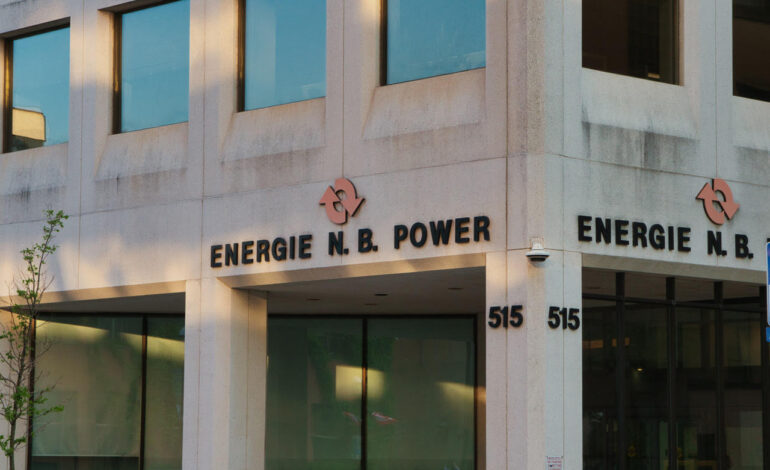
NB Power is seeking a 4.75 per cent rate hike for customers in the spring.
The utility said it will add $10.90 per month for the average residential customer using 1,350 kilowatts (kWh) per month – or about $130 per year. The province’s main utility will file an application with the Energies and Utilities Board (EUB) for review with the increase scheduled to apply across all rate classes on April 1, 2026.
Lori Clark, the president and CEO of NB Power, said its debt is expected to continue to increase given the “significant capital investment” the utility plans to make in the infrastructure.
In May, the deadline to reduce the utilities more than $5 billion in debt from 80 per cent to 20 per cent by 2029 was removed by the Liberal government.
“We would have seen a 15 per cent increase in rates had we been regulated to meet the 80-20 debt equity ratio by 2029,” she said speaking with reporters last week. “The mandate letter we received from the shareholder said we need to make progress but there is no defined date.”
This rate hike application comes after a 9.7 per cent rate hike in April 2025.
Clark explained that rates have been low for many years, which has left the company in this situation.
“We always try to keep rates low and it is always a last resort before you raise rates for customers,” she said. “But we’re at a place where in order to continue to provide secure, safe, reliable electricity for New Brunswickers now and into the future, we need to deal with the infrastructure deficit that we have and the new assets that we have to bring on [to] the system to deal with the increasing load in the province.”
She said the utility did consider a higher rate increase. Charlotte County has struggled with unreliable power in the past, including during a major storm in December 2023.
On Canada Day in 2024, power was cut off to Saint Andrews following contact by an animal with power infrastructure.
It said the primary reason for the continued rate hike is 80 per cent for improvements in reliability and station performance to address infrastructure deficit and 20 per cent due to inflation, market prices and customer support.
In February, J.D. Irving Ltd laid off 140 employees due to what it called “uncompetitive industrial electricity rates.”
The company also faced scrutiny over smart metres in the winter after many customers complained to the utility that power bills had spiked significantly.
A third-party independent review said there were no issues with the metres but rather was a combination of colder weather, longer billing cycle and less power outages.
Point Lepreau offline in 2026
Clark said the Point Lepreau Generating Station is also expected to be shut down next year – in addition to it being offline for about 8 months in 2024, and scheduled to be offline for 140 days – which began in July.
Clark has previously said the outage costs about $1 million per day.
“There is an outage planned in the 2026-27 application that would last 419 days,” she said.
Point Lepreau, located in Charlotte County, was brought up during a visit by the three-person review panel that visited Saint Andrews.
The review was initiated by the Liberal government to explore options about the utility’s future, which could include the sale of the Crown corporation.
Kim Reeder, a resident of Saint Andrews, spoke about how long Lepreau was offline and how it isn’t generating any power for the folks who continue to pay for it.
“It seems during marketing that nuclear and Lepreau is promoted as the be-all-end-all, but there are so many days a week, and so many months a year, that Lepreau isn’t running,” she said during an interview with The Courier at the time. “And we act like it is.”
In the meeting, Anne Bertrand, Duncan Hawthorne and Michael Bernstein spoke about the fact they think Lepreau can be successful, but it needs work.
They said the recommendations they make will all be actionable.
“Whatever we recommend, we see as being actionable and if there isn’t a will to action, then I don’t know why we’re here,” Hawthorne said during the meeting.
Review ‘unique opportunity’
Clark said she thinks the review being undertaken by the panel and the government is a unique opportunity – adding many levels including the board of directors and union that want change.
“The 4.75 [per cent] was what we told New Brunswickers is how we would raise rates in our three-year plan, and given the amount of uncertainty we’re facing, it was the right number,” she said.
The utility is estimating that rates could increase by 6.5 per cent in the coming years, but Clark said it will review those numbers as the comprehensive review continues as recommendations are finalized.
“We will do everything we can to minimize that increase,” she said.
Now that the utility has submitted the application to the EUB, a hearing is expected to be called in the early winter of 2025, and in late winter 2025 a decision could be issued for rates to increase on April 1, 2026.




